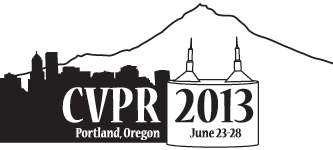-
Multi-image Blind Deblurring Using a Coupled Adaptive Sparse Prior
AbstractThis paper presents a robust algorithm for estimating a single latent sharp image given multiple blurry and/or noisy observations. The underlying multi-image blind deconvolution problem is solved by linking all of the observations together via a Bayesian-inspired penalty function which couples the unknown latent image, blur kernels, and noise levels together in a unique way. This coupled penalty function enjoys a number of desirable properties, including a mechanism whereby the relative-concavity or shape is adapted as a function of the intrinsic quality of each blurry observation. In this way, higher quality observations may automatically contribute more to the final estimate than heavily degraded ones. The resulting algorithm, which requires no essential tuning parameters, can recover a high quality image from a set of observations containing potentially both blurry and noisy examples, without knowing a priori the degradation type of each observation. Experimental results on both synthetic and real-world test images clearly demonstrate the efficacy of the proposed method.
Related Material
[pdf][bibtex]@InProceedings{Zhang_2013_CVPR,
author = {Zhang, Haichao and Wipf, David and Zhang, Yanning},
title = {Multi-image Blind Deblurring Using a Coupled Adaptive Sparse Prior},
booktitle = {Proceedings of the IEEE Conference on Computer Vision and Pattern Recognition (CVPR)},
month = {June},
year = {2013}
}
These CVPR 2013 papers are the Open Access versions, provided by the Computer Vision Foundation.
Except for the watermark, they are identical to the accepted versions; the final published version of the proceedings is available on IEEE Xplore.
Except for the watermark, they are identical to the accepted versions; the final published version of the proceedings is available on IEEE Xplore.
This material is presented to ensure timely dissemination of scholarly and technical work.
Copyright and all rights therein are retained by authors or by other copyright holders.
All persons copying this information are expected to adhere to the terms and constraints invoked by each author's copyright.

